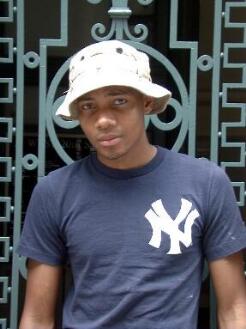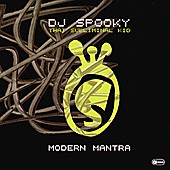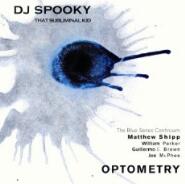Music for the Gene-Splice Generation: A Conversation With DJ Spooky That Subliminal Kid
by dave heaton
 A photo on the inside cover of Modern Mantra, the new mix CD from DJ Spooky That Subliminal Kid, aka Paul Miller, shows a bookshelf with piles of books, magazines, CDs and more. It's a clue to where he's coming from: you know anyone whose book shelf includes both a record he did with Wu-Tang associate Killah Priest and books like The Nature of Rationality is coming from a deeper place than your average musician, not to mention your average person on the street. He thinks about the connections--between ideas and art, between music(s) of the past and present--and explores them through his creations. Whether he's creating illbient records that mix abstract soundscapes and atmospheres with classic hip-hop sounds and techniques or crafting a mix CD using other musicians' works (as he does with the Shadow Records catalogue on Modern Mantra), he's thinking critically about what he's doing and why, about where it fits in the bigger scheme of things, musically and socially speaking. That isn't to say, however, that he lets intellect get in the way of making music that will move listeners. His albums are likely to include essays about where they're coming from and what ideas influenced the music, yet the music itself is never anything less than spellbinding, as he takes myriad sounds and musical streams and splices them into something new. A prime example of that is his most recent release Optometry, featuring what he calls "jazz for the gene-splice generation." Though it was released after the interview below, and thus is, regrettably, only briefly discussed, it needs to be checked out by anyone interested in new sounds coming from intersections of the old. On one level it's a jazz album, featuring some of today's most skilled musicians (like Matthew Shipp, William Parker, Guillermo E. Brown and Joe McPhee), but it also incorporates hip-hop, spoken-word poetry, minimalism and more, all filtered through Spooky's personal vision. "Think of Optometry as sound-art," he writes in the liner notes, "a way of seeing why concepts and sounds converge and, listen for all the new forms you see coming out of your stereo when you press 'play'." That meeting of sounds and ideas is what everything he does is about--through his music he's trying to take us to new sonic planes. And, if you ask me, he's succeeding. DJ Spooky recently answered questions, about Modern Mantra and his music in general, over e-mail. His answers were gracious, detailed and enlightening.
A photo on the inside cover of Modern Mantra, the new mix CD from DJ Spooky That Subliminal Kid, aka Paul Miller, shows a bookshelf with piles of books, magazines, CDs and more. It's a clue to where he's coming from: you know anyone whose book shelf includes both a record he did with Wu-Tang associate Killah Priest and books like The Nature of Rationality is coming from a deeper place than your average musician, not to mention your average person on the street. He thinks about the connections--between ideas and art, between music(s) of the past and present--and explores them through his creations. Whether he's creating illbient records that mix abstract soundscapes and atmospheres with classic hip-hop sounds and techniques or crafting a mix CD using other musicians' works (as he does with the Shadow Records catalogue on Modern Mantra), he's thinking critically about what he's doing and why, about where it fits in the bigger scheme of things, musically and socially speaking. That isn't to say, however, that he lets intellect get in the way of making music that will move listeners. His albums are likely to include essays about where they're coming from and what ideas influenced the music, yet the music itself is never anything less than spellbinding, as he takes myriad sounds and musical streams and splices them into something new. A prime example of that is his most recent release Optometry, featuring what he calls "jazz for the gene-splice generation." Though it was released after the interview below, and thus is, regrettably, only briefly discussed, it needs to be checked out by anyone interested in new sounds coming from intersections of the old. On one level it's a jazz album, featuring some of today's most skilled musicians (like Matthew Shipp, William Parker, Guillermo E. Brown and Joe McPhee), but it also incorporates hip-hop, spoken-word poetry, minimalism and more, all filtered through Spooky's personal vision. "Think of Optometry as sound-art," he writes in the liner notes, "a way of seeing why concepts and sounds converge and, listen for all the new forms you see coming out of your stereo when you press 'play'." That meeting of sounds and ideas is what everything he does is about--through his music he's trying to take us to new sonic planes. And, if you ask me, he's succeeding. DJ Spooky recently answered questions, about Modern Mantra and his music in general, over e-mail. His answers were gracious, detailed and enlightening.
What's the story behind Modern Mantra? Did Shadow Records specifically ask you to do it?
Modern Mantra is just a placeholder in my mind, ya know? Think of beats and flows ya know... Instinct records/Shadow records has been a force on the electronic music scene for a while, and it was fun to go through their archive. It was kind of like going through the sounds of the last decade and just seeing where I could jump in and pull something new from the past. The Shadow recordz crew asked me to do it a while ago, and I think that the material they let me check out was mad overlooked... they didn't have the same hype as a lot of normal Brit stuff, and it was a pleasure to try to get them into a little bit of a different situation. I always like to think of every mix as a kind of "myth science" - the science is in the collage, the flow, the flux. Like Duke Ellington used to say "who is playing in the shadow of whom?" I like the idea of a record made of shadows... it's a perfect metaphor for American electronic music.
What is the process of creating a mix CD like? How do you decide which songs to include, what order to put them in, etc.?
Making a mix CD is a paradox: it's personal and impersonal, kind of like watching TV using TIVO software and trying to figure out what commercials to edit out, and what to leave in, or like deciding what chess moves you want to make in a game with yourself. Mainly though, it's just going through lots and lots of music and figuring out that artform - selection - and pulling yourself into the soundz. The tracks I choose were both from a lot of people I know like Bill Laswell, Dj Krush or Moby, to other people whose work I'd never heard of before, but I ended up liking alot, like Dj Goo from Switzerland. I like to just think of this all as audio alchemy, the order of the tracks was kind of like just figuring out which configuration would draw people into my mindset. The order was like "bring people in, open 'em up... show 'em that alchemy flow... and break it down again."
Often mix CDs are created to introduce many musicians at once, or as a backdrop for dancing. What overall impression would you like listeners to leave Modern Mantra with?
 The whole mix scene is really saturated with compilations these days. I'm more into figuring out different people's tastes. Which is why I liked stuff like Dj Krush's "Code 4109" mix or even earlier stuff like Afrika Bambaata's "Death Mix" - Modern Mantra is an echo of that stuff... I want people to think of mix culture as actually that: a mix... So many compilations just focus on one thing, and man, that's mad boring. It's a diverse world... I want to make a soundtrack to flesh out those impulses, sound as universal language, sound as a way to show the linkages between everything.
The whole mix scene is really saturated with compilations these days. I'm more into figuring out different people's tastes. Which is why I liked stuff like Dj Krush's "Code 4109" mix or even earlier stuff like Afrika Bambaata's "Death Mix" - Modern Mantra is an echo of that stuff... I want people to think of mix culture as actually that: a mix... So many compilations just focus on one thing, and man, that's mad boring. It's a diverse world... I want to make a soundtrack to flesh out those impulses, sound as universal language, sound as a way to show the linkages between everything.
Doing a mix CD seems like a different project from some of your other CDs, where you're essentially creating your own musical universe. In what ways do the two types of projects differ for you?
Yeah, no doubt... I want to flex on the mix CD scene for a little while 'cause that's what makes things flow through different zones.... if I stuck in the experimental set, or if I stuck in the hip-hop set, or if I stuck in the breakbeat set, that wouldn't be that exciting for me. When you make tracks you invoke a lot of your own impressions. When you make mixes, you take other people's impressions (expressions) and remix 'em... that's the core thing with dj'nig for me - how to balance between what's going on inside and outside my head... my own tracks are vector points for that kind of thinking process. I mix them with other people's stuff when I spin live, so I thought that the Modern Mantra mix would be a good way to balance these multi-verses, ya know? References for the mix are stuff like Charlie Parker's Birdland Sessions, Afrika Bmabaata's "Death Mix," early hip-hop stuff like "Flash to the Beat" or even Steinski and Double D's "The Lesson." But Modern Mantra is global - Dj Krush represents that Japan flava, Dj Goo flows from the Swiss secret bank accounts of the turntablist scene... etc etc ya know? It's certainly not about just sampling some old soul and funk breaks.... but even if it was, that'd be fun too... everything has its place and moment. That's the Modern Mantra situation.
Last year you made a really fascinating CD to complement an issue of Nest magazine. What can you tell me about how that came to be, and how you approached writing a soundtrack to a magazine?
I made the Nest Magazine stuff as a kind of "acoustic magazine" - the sounds were for each article, and they were meant to be a stand alone too. It was an ILLbient project, but at the same time, it was something that was meant to be an "attention focuser" rather than the usual ambient "bliss-out" type stuff. I like electronic music that brings people's sense of environment into sharp clarity, and the CD was something that flows like that. Think of it as a kind of ILLbient soundtool for reading. Sound text becomes literary text. I like the idea of the "phonograph" as sound writing - "phono" and "graph" are the terms that translate the situation, ya know?
You've done some collaborative CDs, such as with Scanner and Freight Elevator Quartet. Do you anticipate working with those musicians again? Is there anyone else you're dying to collaborate with?
Yeah, I'm mad into doing collaborations. There's some folks out there that I haven't worked with yet, like Kut Masta Kurt, or Pierre Boulez that are in the near future, but that still remains static. Collaborations are like having a conversation or a file exchange with someone you think can reflect and bounce back something interesting. I also want to do something with Ornette Coleman sometime too... Some of the weirder collaborations I've done with people like Thurston Moore and Yoko Ono are just sitting on my bookshelf... I want to release some of that stuff. I'm starting a record label to do exactly that: it's called "Synchronic" and the first releases are from stuff I did with Killa Priest a while ago, and the record version of Marshall Mcluhan's classic book The Medium is the Massage - all that stuff starts the autumn, so check www.synchronicrecords.com for the release schedule.
You have an album titled Optometry scheduled for release in July on Thirsty Ear--what can you tell me about what that will be like?
 Optometry is a jazz project, but it's a beat situation, ya know? I worked with some of my favorite jazz downtown musicians like Matthew Shipp, William Parker, Joe Mcphee etc etc to come up with material that could be sampled and re-spliced... the philosophical zone that we all span is like "wildstyle' jazz meets hip-hop in the remixed city... I like to think of it as be-bop for the gene splice generation. It was fun to mess around with a lot of jazz elements played by "live" people - I've done so much sampling for a long time. I think on my next full-length album, I'll probably have a lot more "live" stuff too... I love the idea of people playing "elements" and opening up the situation to the computer. I really want to do some Duke Ellington stuff sometime in the near future, but for the moment, I think I'll roll with the Optometry jazz thing as a way to flip the equation on dj culture - jazz is all about flow, and so is dj'ing, so why not combine 'em in some new ways.
Optometry is a jazz project, but it's a beat situation, ya know? I worked with some of my favorite jazz downtown musicians like Matthew Shipp, William Parker, Joe Mcphee etc etc to come up with material that could be sampled and re-spliced... the philosophical zone that we all span is like "wildstyle' jazz meets hip-hop in the remixed city... I like to think of it as be-bop for the gene splice generation. It was fun to mess around with a lot of jazz elements played by "live" people - I've done so much sampling for a long time. I think on my next full-length album, I'll probably have a lot more "live" stuff too... I love the idea of people playing "elements" and opening up the situation to the computer. I really want to do some Duke Ellington stuff sometime in the near future, but for the moment, I think I'll roll with the Optometry jazz thing as a way to flip the equation on dj culture - jazz is all about flow, and so is dj'ing, so why not combine 'em in some new ways.
What other projects do you have going on, currently or in the near future?
I'm in the middle of starting a new magazine, check out the test issue: www.21cmagazine.com and I'm still working on my new album. My other large scale "art project" is a remix of D.W. Griffith's film Birth of a Nation - it's an old Ku Klux Klan film that I've wanted to fuck around with for a while... that will premier at Massachussetts' Musuem of Contemporary Art. There's also a remix of a chess game Marcel Duchamp played with himself a long while ago that I'm tying to music, and that's going to premier at L.A.'s MOCA. Both of those are towards the end of this summer... it's a hectic time...
You seem to travel about quite a bit. What parts of the world particularly excite you right now?
I have to admit, I'm really into the Swiss scene at the moment. They have some great music happening, and they have an amazingly beautiful country. I'm writing to you from the Swiss Alps, 'cause I'm at a place I'm working on a project called the "European Graduate School" - check out the site, www.egs.edu. It's a project I'm working on with Jean Baudrillard, John Waters, Chantal Ackerman, Sandy Stone, and various others... it's a beautiful, mellow spot.
One last question, if you don't mind. Modern Mantra includes a track that features Sun Ra's voice, and the last time I saw you perform live (in Lawrence, KS) you had a Sun Ra Meets John Cage album with you. What's your favorite Sun Ra recording, and why?
My favorite Sun Ra recording is a pretty rare record of him playing electric organ near the Egyptian Pyramids in the late 1960's for an hour. It's some of the weirdest sounds I've heard produced by a human being. I love Sun Ra because he always pushes things. The Sun Ra VS John Cage record is like some kind of far left field juxtaposition - think, I don't know... like a Penguin in Jamaica or something... to get an idea of how wild that is... just think about when two vectors collide in a mathematical set of variables, and you couldn't come up with a weirder collaboration. I want to do stuff like that... but yeah, anyway, my favorite Ra recording is Sun Ra Live at the Pyramid. It's another one of those wildstyle situations I love to think about: electricity, pyramids, wild costumes, and someone who didn't accept any of the divisions we normally see in electronic music, jazz, or history: it was all a mix. That's the Afro myth science of the 20th century.
{Also be sure to check out DJ Spooky's web site: www.djspooky.com}
Copyright (c) 2005 erasing clouds |
Photo of DJ Spooky taken by Enrique Candioti. |